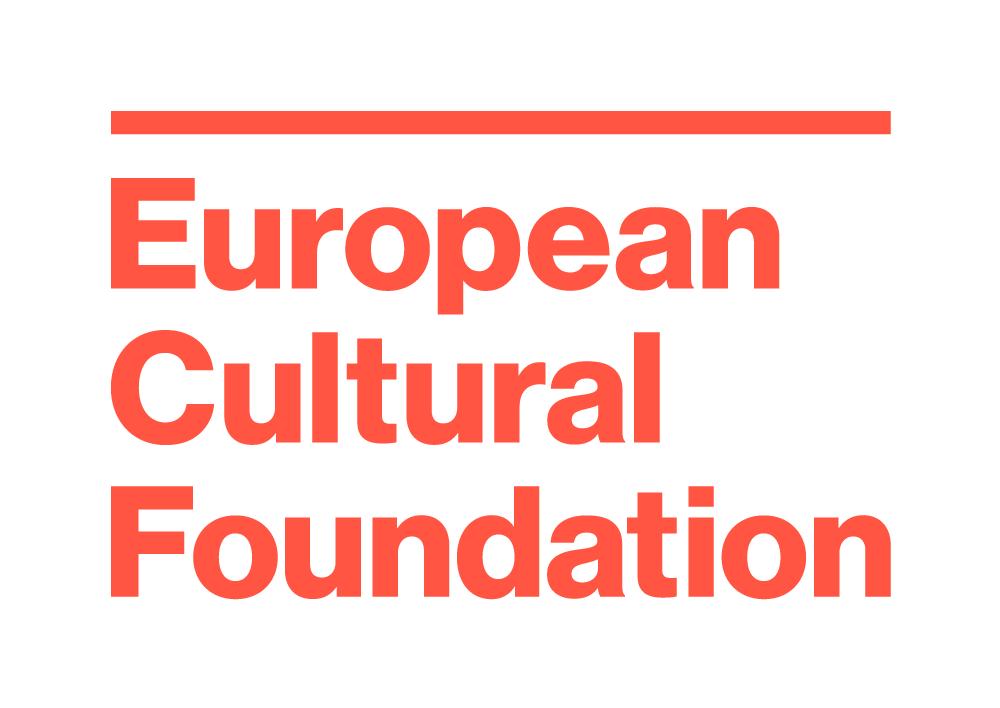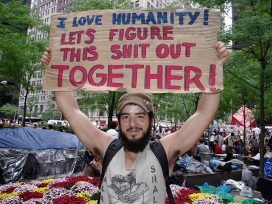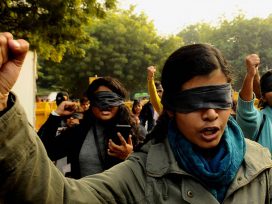Mobilizing law for solidarity
The enfranchisement of migrants can overcome the democratic deficit, however ethno-nationalism’s xenophobic understanding of the political community requires a political, not a legal solution, argues social anthropologist Shalini Randeria.
Anna Wójcik: Increased border controls have become one of the most important political demands in European politics. But is it possible to eliminate the porousness of borders?
Shalini Randeria: Borders are ambivalent institutions. They are designed to control the movement of people and goods, but fail to do so, or do so only partially and selectively. Under growing public demand for greater security and state control of borders, we see higher walls, larger fences and more expensive surveillance technology being installed on the US-Mexico border, the India-Bangladesh border or the Italian coast. But these remain for the most part cosmetic, populist measures designed primarily to influence public perception. They are unable to prevent people fleeing destitution, civil war and hopelessness from moving across transnational borders in search of a better, more secure existence.
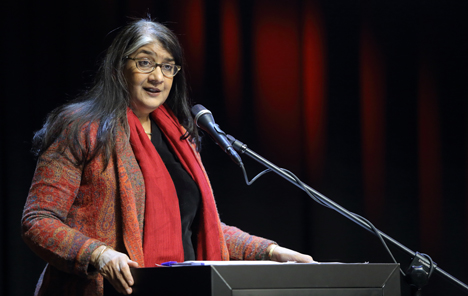
Shalini Randeria, Gdansk, 4 December 2016. Photo: Grzegorz Mehring / Archiwum ECS.
The legal distinction between migrants and refugees has long been rendered obsolete. The porousness of borders also reflects the demand for cheap labour in the economy, be it for domestic work, in the care sector, for low paid agricultural work or stigmatized sex-work. So while the state strives to maintain the illusion of sovereign border control, the demand in all western European countries not only for unskilled labour but also for skilled workers, be they plumbers and electricians, doctors and engineers, top managers and academics, or in the IT or banking sectors, draws these workers from within and outside the European Union on very different terms. In general one could say that those who are better insured are the ones who face the least risk when crossing borders, while those whose lives are at most risk at home and in transit lack any insurance whatsoever.
Why do goods and people not move equally freely?
Borders today control the movement of peoples and goods in highly asymmetrical ways. The entire legal and economic architecture of neo-liberal governance has been established to facilitate the free transnational movement of goods, certain services and capital. Liberalization of trade and capital flows is largely to the advantage of powerful multinational corporations, who are even able to sue states for the violation or undermining of their rights as investors. The rights of citizens, let alone those of migrants or refugees, are not afforded similar protection. Both states and corporations have rendered themselves increasingly unaccountable to citizens.
Does the transnationalization of law further or hinder the prospect of achieving global solidarity?
The transnationalization of law proceeds very differently in different areas, involves different actors and has different effects. Various fields of law are transnationalized at different speeds and in different ways. For example, the contrast between the field of trade law and those of human rights or humanitarian law could not be greater. The transnationalization of human rights law is a bottom-up process involving non-state actors, NGOs and social movement activists, who are the drivers of changes and use the existing architecture of international conventions to which states are signatories, in order to hold them accountable to their commitments. Activists translate and domesticate fundamental rights protection standards in the national or regional context but also enable transnational solidarity. This complex process involves translating international human rights norms and anchoring them in local settings within nation-states. However, those rights may be endangered by the transnationalization of trade or intellectual property protection law, which involves international organizations like the WTO but is also driven by large multinational corporations and governments concluding bilateral agreements. The lobbying interests and the lack of transparency surrounding current negotiations around CETA and TTIP are a case in point.
Visegrad countries have recently come up with the idea of ‘flexible solidarity’ in response to the refugee crisis, which is meant as an alternative to relocation or migrant quotas. On a practical level, this would involve more humanitarian aid and support for refugees in camps located in countries close to conflict zones. Can solidarity be flexible, or is this a contradiction in terms?
‘Flexible solidarity’ is an oxymoron. There can be no solidarity of convenience. Jozef Tischner’s resounding call to solidarity in his Ethics of Solidarity is more relevant than ever amidst the politics of fear, resentment, and hostility, which govern futile attempts at building walls to fence ourselves into narrow national territories and cultures. His ethic of solidarity is a universalistic one, though deeply Christian in its roots, and arising from the very particular circumstances in Poland. He asks: Whom should solidarity be directed towards? His answer is: we owe especially deep and strong solidarity to those who have been hurt, wounded by other human beings, and who as a result have suffered avoidable, unnecessary and arbitrarily inflicted suffering.
It would be a travesty of his idea of solidarity if it were turned into a matter of geopolitics and instrumentalized for domestic or international political purposes. There is no contradiction between the EU providing support to the camps in conflict zones and also taking in a certain number of refugees directly from the regions most severely affected by civil war. This would obviate the need for refugees to take recourse to the services of unscrupulous traffickers. And the EU would not have to outsource its human rights obligations to the Erdogan government. Greater humanitarian and development aid for refugees in camps for educational, health and economic purposes is an excellent idea that should be urgently put into practice. For it is the poorer countries in Africa, Asia and the Middle East which bear the burden of the world’s refugees.
Why are these discussions taking place in Europe now? Why is there a demand for setting limits to solidarity?
Integrating migrants and refugees is proving to be a problem in Europe despite the relatively small numbers who reach our shores, in comparison with those who are in camps in the region, as has been the case for decades. Paradoxically, it is two of Europe’s great achievements that are the obstacles to integration, namely liberal democracy and the welfare state. Why do migrants and refugees integrate into working life in the US but into welfare in western Europe? European welfare states grant these newcomers relatively generous welfare benefits, albeit increasingly less so. And complicated legal regulations, language barriers and the need for formal qualifications even for low wage jobs make it very difficult for foreigners to enter the labour market.
Compared to the United States, the naturalization of immigrants in most European countries is a cumbersome and long drawn-out process. Nevertheless, as Donald Trump’s electoral triumph shows, xenophobic sentiments can be successfully whipped up even in a country of immigrants. This is especially easy in a situation where political parties and elites have long neglected the plight of the many losers of neo-liberal economic globalization. But anti-immigrant sentiment in Europe also points to the alarming separation of ‘liberalism’ and ‘democracy’. Liberal principles demand adherence to the rule of law and to freedom of movement. Electoral politics in illiberal democracies, however, dictate disrespect for the rule of law and international treaty obligations. Populist parties, who represent themselves as the guardians of European values and Christian civilization, are advocating all over Europe a turn away from liberal principles. Democracy in many European countries, as in African ones, is simply being reduced to multi-party elections.
Can legal instruments be used to counteract the rise of ethno-centric solidarity that diminishes a more universalistic understanding of solidarity?
The rise of ethno-nationalism, with its narrow xenophobic understanding of the political community, is a political phenomenon that requires a political, not a legal solution. One cannot ban such parties or such propaganda in a democratic system, even though the spread of untruths in election campaigns, as seen during the Brexit campaign, pose a grave danger for democracy. The law can help to strengthen the rights of refugees and migrants. By conferring citizenship rights, they could be included in the political community, thus giving them a chance to be involved in processes of collective deliberation. Today European societies also suffer from a democratic deficit, because large numbers of migrants are disenfranchised, they have no political rights although they pay taxes. Moreover, populist policies are whittling away at their social and economic rights as well.
Why does the law fail to adapt to economic and social realities?
The law is Janus-faced; it can be repressive or emancipatory. It can either lag behind or be far ahead of societal norms. It can reflect changes in society, or can work as a catalyst for social change. And often there is a gap between law on the books, i.e. norms as enshrined in the law, and law in practice. In many countries, labour law and anti-discrimination law affords women much stronger rights than they enjoy in practice. Despite the legal requirement of equal pay for equal work, this has hardly been achieved in practice anywhere in the world. Or take the opposite case, in many countries the law does not permit gay marriages but gay and lesbian couples manage to live together nevertheless. The law defines the minimum that needs to be maintained, not the maximum to be achieved, or aspired to.
This interview was held during the 10th Conference on Solidarity / 27th European Meeting of Cultural Journals in Gdańsk, 4-6 November, organized jointly by Eurozine, the Institute for Human Sciences in Vienna, the European Solidarity Centre in Gdańsk and Res Publica Foundation.
In partnership with:
Erste Foundation and Mayor of Gdańsk
Co-funded by:
Ministry of Foreign Affairs, Republic of Poland
Foundation for Polish-German Cooperation
Connected action for the Commons, European Cultural Foundation
Project co-financed by the Ministry of Foreign Affairs of the Republic of Poland
Published 17 January 2017
Original in English
First published by in Res Publica Nowa, Special Edition 'Mobilizing for the Commons' 2016; Eurozine
Contributed by Res Publica Nowa © Eurozine
PDF/PRINTIn collaboration with
In focal points
- Disintegration or revival?
- Mobilizing law for solidarity
- Solidarity after Machiavelli: An interview with Ira Katznelson
- Liberalism, populism and the challenges of post-transformation in eastern Europe and beyond
- The limits of solidarity
- On the borders of solidarity
- The crisis of neoliberalism in Europe
- Utopian dreams beyond the border
- The politics of nature in the Anthropocene
- Strangers when we meet: Identity and solidarity
Newsletter
Subscribe to know what’s worth thinking about.
Related Articles

The price of freedom
A transatlantic conversation
At a moment that is Hamletesque in Minsk and Washington alike, Marci Shore illuminates moments of choice, and what these mean for freedom and human dignity. The following is a transatlantic conversation inspired by Ukraine, moderated by Kant and open to all.
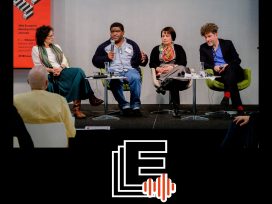
Contaminated words
A conversation on European belonging
Can a sense of belonging exist that both encompasses nationhood and goes beyond it? Gary Younge, Susan Nieman and Jan Plamper look for a European identity that turns neoliberal ideology around.
